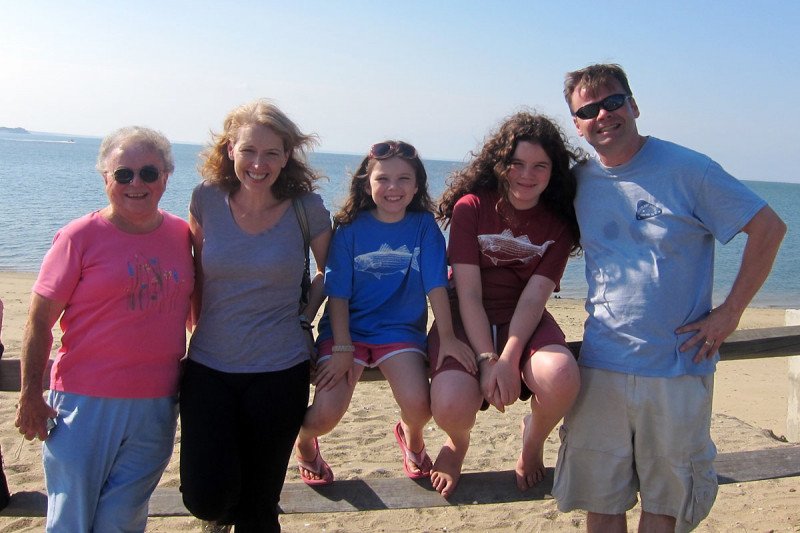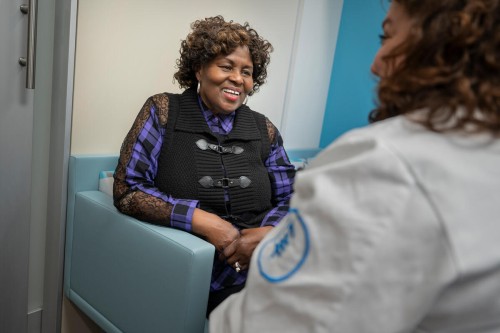
When Mary Elizabeth Williams was diagnosed with stage 4 melanoma, she says: “My identity and my relationship with my mortality changed. That was the beginning of my new life.”
Her decision to publicly disclose her diagnosis soon after receiving it was easy, she says. “I went to Memorial Sloan Kettering, and I saw other people in that waiting room — the diversity of faces and how many people are going through the same thing. We all look for meaning in our experiences. Telling my story was a way of giving it context.”
Mary Elizabeth, a journalist, went on to write A Series of Catastrophes and Miracles. She recently sat down with Diane Reidy-Lagunes, a medical oncologist and host of Cancer Straight Talk from MSK, a podcast for people with cancer and their loved ones.
For Mary Elizabeth and her husband, revealing her diagnosis to their children was one of the biggest challenges. “We tried to stay honest with the kids,” she says. “We tried to say, ‘It’s not about things we can control; it’s about how we deal with the things that we can.’”
Finding the courage to have the conversation around a cancer diagnosis can be daunting, says Mary Elizabeth. She describes the support she received from Gilda’s Club (now known as Red Door Community, in New York City) as “absolutely life-changing” for herself and her kids. “To have a refuge where you can just say, ‘I’m not doing so great’ is enormous.”
Diane Reidy-Lagunes sits down with journalist, author, and melanoma survivor Mary Elizabeth Williams to discuss what it was like being part of a phase 1 clinical trial, how clear communication can affect health outcomes, and more.
A Landmark Lifesaving Clinical Trial
Mary Elizabeth’s cancer, metastatic melanoma, has a 27% five-year survival rate, but a clinical trial saved her life. In 2011, she and nine other patients participated in one of the first phase 1 immunotherapy trials at MSK, a study based on a concept never before tested in humans that a patient’s own immune system could be trained to fight their cancer. She worked with Jedd Wolchok, a medical oncologist at MSK.
It was at times an overwhelming experience. Feeling empowered to speak up as a participant of a clinical trial is important for not only the patient but also the success of the trial, she says. Mary Elizabeth explains that clear and empathetic patient-provider communication is key so that patients feel respected and that they have agency over their treatment. “Figuring out ways that make the system more sensitive to everybody [will be] good for everybody. Jedd Wolchok really is just, for me, the platonic ideal of what a doctor-patient relationship can be, especially in the clinical trial space.”
Relationships
Mary Elizabeth says that after receiving a cancer diagnosis, navigating relationships with family and friends can be difficult, especially with those who have never experienced cancer in their own lives. “The snow globe of your life is going to get shaken up, and everybody’s going to land in different places. As hard as it is to lose relationships, I never felt alone. I promise there are people around you who get it.”
Sometimes people make insensitive comments, but Mary Elizabeth says the least helpful thing anyone can say to someone with cancer is nothing at all. “All you really need to do is just let the person know, ‘You’re still on my radar.’ It means everything in the world,” she says.
Survivor’s Guilt
Ten years after her treatment, Mary Elizabeth shows no evidence of disease. “Ultimately, a lot of it comes down to genetics, where you are treated and who your doctors are, and where the science is in a particular moment,” Mary Elizabeth says. While she was being treated, a close friend of hers was also battling cancer, and she passed away.
“It’s hard just kind of feeling like, ‘Maybe I was just the beneficiary of dumb luck from the universe,’ and ‘I don’t know why I’m here; I don’t know why some of my friends aren’t,’” says Mary Elizabeth. “I know I got very, very lucky, and I just kind of try to take the win.”
To hear more of Mary Elizabeth William’s cancer journey, tune in to this episode of Cancer Straight Talk from MSK.


